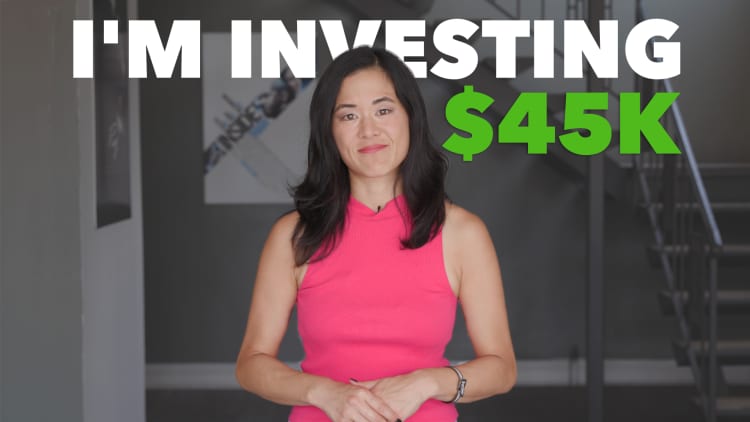During bull markets, an old Wall Street saying goes, everyone is a genius. Your social media feed probably told you as much: a non-stop stream of crypto-bros, penny-stock pickers, and drivers of Maseratis paid for in dogecoin.
But when markets slide those who treated their investments like short-term cash machines often pay the price, says Brad Klontz, a certified financial planner and financial psychologist at Creighton University.
"I've seen some videos on social media coming out actively urging people to sell," he says. "It's the mirror of the exuberant buy, which is the panic sell. Telling people to leave their money on the sidelines is the worst advice you could give people right now."
For long-term investors, a choppy market is an opportunity to add to their portfolios, not sit things out, says Klontz. And while thinking this way may feel counterintuitive, it's an essential mindset for those looking to build wealth over time.
"It really does flesh out people who have a 'poor mindset' around investing and those who have a 'wealth mindset,'" he says.
'Wealth mindset' versus 'poor mindset'
Everyone who has ever put a nickel into the markets has more or less wanted the same thing: for that nickel to turn into a dime. Or a dollar. Or 10. But how and on what timeline you hope to achieve those gains can have a huge impact on your portfolio, says Klontz.
Those hoping to achieve fast and prodigious returns are often setting themselves up for failure, he adds.
"The poor mindset says this: 'I have $10,000. I've scraped together every last dime to get it. How can I make that into $100,000? Or a million?,'" Klontz says. "That's the poor mindset, and those people are getting destroyed."
On the flip side, he adds, "The wealth mindset is less about taking a chunk and trying to multiply it and is more of an approach, a philosophy," he says. "Where can I stick $200 a month so that in 30 years I'll have $1 million?"

Video by Helen Zhao
3 investing mistakes people make when they want to get rich quick
Klontz's wealth mindset relies on the historical upward trajectory of the broad stock market. By investing consistently through market ups and downs, you buy more shares when stock prices are low and fewer when they're high. Over time, you theoretically build wealth by owning broad swaths of the market, buying when things are cheap, and letting compounding interest work its magic.
People of Klontz's poor mindset though have got it backwards. "If you're trying to take a chunk of money and get rich quick, if that's your mindset, you're going to do everything wrong," he says.
Here are three mistakes people who think this way get wrong about the markets.
1. They're not diversified
Wise long-term investors usually spread their bets across a variety of assets, knowing that an outsize loss in any one particular investment won't crater their portfolio's performance. Over the course of decades, having a broadly diversified portfolio smooths returns and dulls the sort of sharp downward jolts that can cause investors to panic.
Those hoping to get rich quick likely focus on one or two investments that they expect to deliver outsize returns. Over short periods, that might very well be possible. But any single investment can go down, and go down by a lot. And with dogecoin down 89% from its May high, payments on that Maserati start to look a little steeper.
2. They try to time the market
By investing at a consistent clip, long-term investors take the temptation to try to time movements in the stock market off the table, and that's a good thing, market experts say. Because even professional investors find it nearly impossible to do.
But that doesn't stop traders from trying. Even though study after study has shown that the vast majority of active traders lose money.
By trying to outfox the market, Klontz says, you're opening yourself up to a slew of cognitive biases that will worsen your returns over time. "Never trust your instincts around money," he says. "It's your natural inclination to do it wrong. You're just wired that way."

Video by Helen Zhao
3. They invest in speculative assets
Some assets, such as stocks and bonds, move based on their underlying fundamentals, among other things. Stocks, for instance, trade based on the future earnings power of their underlying companies, and bond prices fluctuate based on moves in interest rates. But speculative assets — such as cryptocurrencies — trade solely based on what investors are willing to pay for them.
This feature makes these assets particularly volatile, which is why you'd be wise to invest no more in them than you're completely willing to lose, financial experts say. Any more than that, and you're putting yourself at the risk of a wealth-crippling drawdown.
Klontz hopes the recent crypto crash has taught some investors a valuable lesson about the risks of speculating rather than investing.
"That's your Vegas money. And if you didn't know that was your Vegas money, now you do," he says. "That's where the lesson is learned, and it's a lesson I learned in my 20s. You don't speculate with your rent money."
The views expressed are generalized and may not be appropriate for all investors. The information contained in this article should not be construed as, and may not be used in connection with, an offer to sell, or a solicitation of an offer to buy or hold, an interest in any security or investment product. Carefully consider your financial situation, including investment objective, time horizon, risk tolerance, and fees prior to making any investment decisions. No level of diversification or asset allocation can ensure profits or guarantee against losses.
The article "How to Have a ‘Wealth Mindset’ Instead of a ‘Poor Mindset’ as an Investor, From a Financial Psychologist″ was originally published on Grow (CNBC + Acorns).


